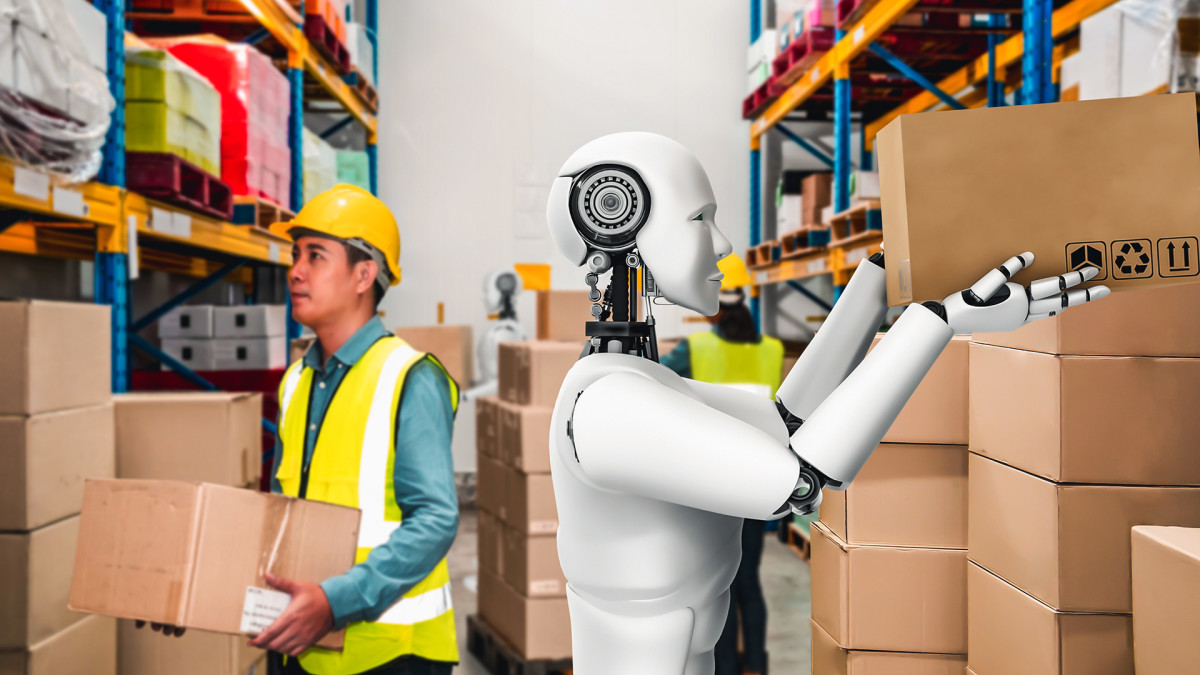
You won't have to tell these employees to wash their hands.
Robots have been a long-time science fiction stable as writers cooked up stories about mechanical marvels who would do our bidding and make our lives so much easier.
Related: New York Times slaps Microsoft, ChatGPT maker with copyright lawsuit
Of course, these tales often took a decidedly dark turn with the machines getting fed up with their creators and wreaking havoc on all humanity.
Now robots are buzzing into the real world as they clean floors, patrol shopping malls, and entertain and educate children.
The restaurant industry is also sending in the bots.
Last month, Cafe X retweeted a video of one of its robots making coffee at Tesla's (TSLA) -) Giga factory in Berlin.
Earlier this year, I Can Barbecue Korean Grill in Tustin, Calif., said the robot waiters Fatima, Elizabeth and Toga were taking on a variety of tasks, including bringing customers to their tables, dropping off food and celebrating special occasions.
Owner John Ozbek first saw robot waiters on Instagram at a restaurant in Japan and “immediately fell in love with this idea because I wanted to bring that experience with my customers over here.”
Company says it's not 'The Terminator'
In May, salad chain Sweetgreen opened the company’s first robotic location in Naperville, Ill, two years after acquiring the robotic-run restaurant start-up Spyce Kitchen.
And now a restaurant in California is addressing the human factor by sharply reducing its presence.
CaliExpress in Pasadena is set to open what is being billed as the world's first fully-AI powered restaurant, where I, Robot will be making the meals for flesh-and-blood customers.
“BurgerBot” and “Flippy," which are made by Miso Robotics, are the chefs cranking out burgers and fries.
"Flippy is a ground-breaking, smart commercial kitchen robot that fries items from french fries to chicken nuggets, and works alongside humans to enhance quality and consistency, while creating substantial, measurable cost savings for restaurants," Miso said on its website.
Last year, the restaurant chain Jack-in-the-Box introduced Flippy products at its San Diego location.
And, despite the name, Flippy isn’t limited to just flipping burgers. The robot can “adapt to various cooking techniques and recipes, making it a versatile addition to any kitchen environment,” the company said.
Customers will make their orders through PopID's facial recognition payment stations.
"It's not a Terminator, it's not Transformers. It's a very friendly, helpful robot," Alana Abbitt, Miso Robotics' vice president of product development told KABC. "There's nice robotics, there's Roombas, there's things in your house that have become much more a part of daily life. That's what we're trying to do."
Freeing up human staff
The kitchen will have a smaller crew than others of comparable size and Miso Robotics said that Flippy can give the human staff by handling repetitive, time-consuming, and dangerous tasks, so they'll be free to "focus on more creative and complex aspects of food preparation."
"There are still humans who will pack the food," Abbitt said. "We do want somebody to assemble, package (the food) and actually be the friendly face to the customer.”
PopID CEO and board member of Miso Robotics John Miller cited other reasons for bringing robots on board.
"They don't call out sick," Miller, founder of tech company CaliGroup, said. "They don't get drunk the night before work and come in with a hangover. They're a little bit more reliable."
The CaliExpress location will also be something of a robot museum that will include dancing robot arms from retired Flippy units, experimental 3D-printed artifacts from past development, and photographic displays.
The rise of robots is causing concern in some circles.
A University of Pittsburgh study last year suggested that while Americans who work alongside industrial robots are less likely to be injured on the job, they are more likely to suffer from adverse mental health effects — and even more likely to abuse drugs or alcohol.
However, the same team found that German workers saw a 5% decrease in injuries but no significant mental health changes when exposed to robotics.
“Robot exposure did not cause disruptive job losses in Germany; Germany has a much higher employment protection legislation,” said Rania Gihleb, an assistant professor in the university’s economics department. “In contexts where workers were less protected, competition with robots was associated with a rise in mental health problems.”
Want to turbocharge your portfolio? Learn from the investing legends and get actionable insights. Start your Real Money Pro membership today.







